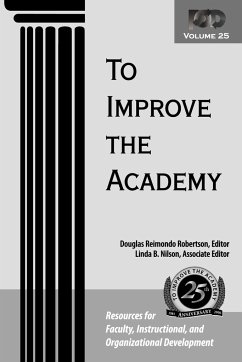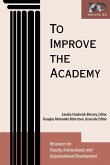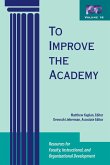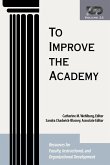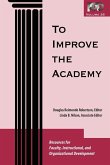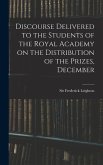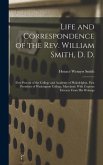To Improve the Academy
Resources for Faculty, Instructional, and Organizational Development
Herausgeber: Robertson, Douglas Reimondo
To Improve the Academy
Resources for Faculty, Instructional, and Organizational Development
Herausgeber: Robertson, Douglas Reimondo
- Broschiertes Buch
- Merkliste
- Auf die Merkliste
- Bewerten Bewerten
- Teilen
- Produkt teilen
- Produkterinnerung
- Produkterinnerung
An annual publication of the Professional and Organizational Development Network in Higher Education (POD), this 25th anniversary edition of To Improve the Academy offers a resource for improvement in higher education to faculty and instructional development staff, department chairs, faculty, deans, student services staff, chief academic officers, and educational consultants.
Andere Kunden interessierten sich auch für
![To Improve the Academy To Improve the Academy]() To Improve the Academy41,99 €
To Improve the Academy41,99 €![To Improve the Academy To Improve the Academy]() To Improve the Academy39,99 €
To Improve the Academy39,99 €![To Improve the Academy To Improve the Academy]() To Improve the Academy40,99 €
To Improve the Academy40,99 €![To Improve the Academy To Improve the Academy]() To Improve the Academy40,99 €
To Improve the Academy40,99 €![Addresses Delivered to the Students of the Royal Academy Addresses Delivered to the Students of the Royal Academy]() Frederic Leighton Leighton of StrettonAddresses Delivered to the Students of the Royal Academy36,99 €
Frederic Leighton Leighton of StrettonAddresses Delivered to the Students of the Royal Academy36,99 €![Discourse Delivered to the Students of the Royal Academy on the Distribution of the Prizes, December Discourse Delivered to the Students of the Royal Academy on the Distribution of the Prizes, December]() Discourse Delivered to the Students of the Royal Academy on the Distribution of the Prizes, December28,99 €
Discourse Delivered to the Students of the Royal Academy on the Distribution of the Prizes, December28,99 €![Life and Correspondence of the Rev. William Smith, D. D.: First Provost of the College and Academy of Philadelphia. First President of Washington Coll Life and Correspondence of the Rev. William Smith, D. D.: First Provost of the College and Academy of Philadelphia. First President of Washington Coll]() Horace Wemyss SmithLife and Correspondence of the Rev. William Smith, D. D.: First Provost of the College and Academy of Philadelphia. First President of Washington Coll41,99 €
Horace Wemyss SmithLife and Correspondence of the Rev. William Smith, D. D.: First Provost of the College and Academy of Philadelphia. First President of Washington Coll41,99 €-
-
-
An annual publication of the Professional and Organizational Development Network in Higher Education (POD), this 25th anniversary edition of To Improve the Academy offers a resource for improvement in higher education to faculty and instructional development staff, department chairs, faculty, deans, student services staff, chief academic officers, and educational consultants.
Hinweis: Dieser Artikel kann nur an eine deutsche Lieferadresse ausgeliefert werden.
Hinweis: Dieser Artikel kann nur an eine deutsche Lieferadresse ausgeliefert werden.
Produktdetails
- Produktdetails
- Verlag: Wiley
- Volume 25 edition
- Seitenzahl: 428
- Erscheinungstermin: 1. September 2006
- Englisch
- Abmessung: 229mm x 152mm x 25mm
- Gewicht: 691g
- ISBN-13: 9781933371085
- ISBN-10: 1933371080
- Artikelnr.: 22987297
- Herstellerkennzeichnung
- Libri GmbH
- Europaallee 1
- 36244 Bad Hersfeld
- gpsr@libri.de
- Verlag: Wiley
- Volume 25 edition
- Seitenzahl: 428
- Erscheinungstermin: 1. September 2006
- Englisch
- Abmessung: 229mm x 152mm x 25mm
- Gewicht: 691g
- ISBN-13: 9781933371085
- ISBN-10: 1933371080
- Artikelnr.: 22987297
- Herstellerkennzeichnung
- Libri GmbH
- Europaallee 1
- 36244 Bad Hersfeld
- gpsr@libri.de
DOUGLAS REIMONDO ROBERTSON is assistant provost and professor at Northern Kentucky University. He has helped to start or reorganize four university professional development centers (Portland State University, University of Nevada, Eastern Kentucky University, and Northern Kentucky University. He is senior editor of the book series on better teaching for new Forums Press, as well as current or past member of the editorial boards for Innovative Higher Education, Journal for Excellence in College Teaching, and Kentucky Journal for Excellence in College teaching and Learning. He is Fullbright senior specialist candidate and a frequent consultant and speaker at colleges, universities, and a diverse array of other organizations. He has authored or co-edited five books including Making Time, Making Change: Avoiding Overload in College Teaching (New Forums press, 2003) and Self-Directed Growth (Brunner-Routledge, 1988). LINDA B. NILSON is founding director of Clemson University's Office of teaching Effectiveness and Innovation. She recently co-edited Enhancing Learning with Laptops in the Classroom (Jossey-bass, 2005) and revised her bestselling guidebook Teaching at Its Best: A research-Based Resource for College Instructors (Anker, 2003), now in its second edition. In addition to teaching a graduate course on college teaching, she leads faculty workshops at universities and conferences both nationally and internationally. Before coming to Clemson, she directed teaching centers at Vanderbilt University and the University of California-Riverside, and was on the sociology faculty at the University of California-Los Angeles.
About the Authors.
Preface.
Introduction.
Ethical Guidelines for Educational Developers.
Section I: Educational Development and the Sociological Imagination.
1. It All Started in the Sixties: Movements for Change Across the Decades-A
Personal Journey (R. Eugene Rice).
2. Living Engagement (bell hooks, Douglas Reimondo Robertson).
3. Surviving to Tenure (James M. Lang).
Section II: Paradigms.
4. A Critical Theory Perspective on faculty development (Stephen D.
Brookfield).
5. The ABCs of fractal Thinking in Higher Education (Edward Nuhfer).
Section III: Educational development and the Schlorship of Teaching and
Learning.
6. Toward a Schlorship of Teaching and Learning in Educational Development
(Peter felten, Alan Kalish, Allison Pingree, Katheryn M. Plank).
7. Faculty Development Through Student Learning Initiatives: Lessons
Learned (Nancy Simpson, Jean Layne, Adalet Baris Gunersel, Blake Godkin,
Jeff Froyd).
8. Action research for Instructional Improvement: Using Data to Enhance
Student Learning at Your Institution (Constance E. Cook, Mary Wright,
Christopher O'Neal).
9. Moving From the Scholarship of teaching and Learning to Educational
Research: An Example From Engineering (Ruth A. Streveler, maura Borrego,
Karl A. Smith).
Section IV: Instructional and Curricular Development.
10. Structuring Complex Cooperative Learning Activities in 50-Minute
Classes (Barbara J. Millis).
11. "Heritage Rocks": Priciples and Best Practices of Effective
Intercultural Teaching and Learning (Peter Frederick, Mary James).
12. How Do You handle This Situation? Responses by Faculty in Great Britain
and the United States to Workshops on the Ethics of Teaching (Miriam
Rosalyn Diamond).
13. In the Eye of the Storm: Students' Perception of Helpful Faculty
Actions Following a Collective Tragedy (Therese A. Huston, Michele
DiPietro).
14. Sustaining the Undergraduate Seminar: On the Importance of Modeling and
Giving Guidelines (Shelley Z. Reuter).
15. Teaching Business by Doing Business: An Interdisciplinary
Faculty-Friendly Approach (Larry K. Michaelsen, Mary McCord).
Section V: Faculty Careers.
16. The Schlorship of Civic Engagement: Defining, Documenting, and
Evaluating Faculty Work (Robert G. Bringle, Julie A. Hatcher. Patti H.
Clayton).
17. How Post-Tenure Review Can Support the teaching Development of Senior
Faculty (Mary Deane Sorcinelli, Mei-Yau Shih, Mathew L. Ouellett, Majory
Stewart).
18. Faculty development in Student Laerning Communities: Exploring the
Vitality of Mid-Career Faculty Participants (Shari Ellertson, John H.
Schuh).
19. Making Meaning of a Life in Teaching: A Memoir-Writing Project for
seasoned faculty (Kathleen F. O'Donovan, Steve R. Simmons).
20. Transforming a Teaching Culture Through Peer Mentoring: Connecticut
College's Johnson Teaching Seminar for Incoming faculty (Michael Reder,
Eugene V. Gallagher).
21. Preparing Future Faculty for Careers in Academic Librianship: A
Paradigm Shift for Collaboration in Higher education (Sean Patrick
Knowlton, Laura L. B. Border).
Bibliography.
Preface.
Introduction.
Ethical Guidelines for Educational Developers.
Section I: Educational Development and the Sociological Imagination.
1. It All Started in the Sixties: Movements for Change Across the Decades-A
Personal Journey (R. Eugene Rice).
2. Living Engagement (bell hooks, Douglas Reimondo Robertson).
3. Surviving to Tenure (James M. Lang).
Section II: Paradigms.
4. A Critical Theory Perspective on faculty development (Stephen D.
Brookfield).
5. The ABCs of fractal Thinking in Higher Education (Edward Nuhfer).
Section III: Educational development and the Schlorship of Teaching and
Learning.
6. Toward a Schlorship of Teaching and Learning in Educational Development
(Peter felten, Alan Kalish, Allison Pingree, Katheryn M. Plank).
7. Faculty Development Through Student Learning Initiatives: Lessons
Learned (Nancy Simpson, Jean Layne, Adalet Baris Gunersel, Blake Godkin,
Jeff Froyd).
8. Action research for Instructional Improvement: Using Data to Enhance
Student Learning at Your Institution (Constance E. Cook, Mary Wright,
Christopher O'Neal).
9. Moving From the Scholarship of teaching and Learning to Educational
Research: An Example From Engineering (Ruth A. Streveler, maura Borrego,
Karl A. Smith).
Section IV: Instructional and Curricular Development.
10. Structuring Complex Cooperative Learning Activities in 50-Minute
Classes (Barbara J. Millis).
11. "Heritage Rocks": Priciples and Best Practices of Effective
Intercultural Teaching and Learning (Peter Frederick, Mary James).
12. How Do You handle This Situation? Responses by Faculty in Great Britain
and the United States to Workshops on the Ethics of Teaching (Miriam
Rosalyn Diamond).
13. In the Eye of the Storm: Students' Perception of Helpful Faculty
Actions Following a Collective Tragedy (Therese A. Huston, Michele
DiPietro).
14. Sustaining the Undergraduate Seminar: On the Importance of Modeling and
Giving Guidelines (Shelley Z. Reuter).
15. Teaching Business by Doing Business: An Interdisciplinary
Faculty-Friendly Approach (Larry K. Michaelsen, Mary McCord).
Section V: Faculty Careers.
16. The Schlorship of Civic Engagement: Defining, Documenting, and
Evaluating Faculty Work (Robert G. Bringle, Julie A. Hatcher. Patti H.
Clayton).
17. How Post-Tenure Review Can Support the teaching Development of Senior
Faculty (Mary Deane Sorcinelli, Mei-Yau Shih, Mathew L. Ouellett, Majory
Stewart).
18. Faculty development in Student Laerning Communities: Exploring the
Vitality of Mid-Career Faculty Participants (Shari Ellertson, John H.
Schuh).
19. Making Meaning of a Life in Teaching: A Memoir-Writing Project for
seasoned faculty (Kathleen F. O'Donovan, Steve R. Simmons).
20. Transforming a Teaching Culture Through Peer Mentoring: Connecticut
College's Johnson Teaching Seminar for Incoming faculty (Michael Reder,
Eugene V. Gallagher).
21. Preparing Future Faculty for Careers in Academic Librianship: A
Paradigm Shift for Collaboration in Higher education (Sean Patrick
Knowlton, Laura L. B. Border).
Bibliography.
About the Authors.
Preface.
Introduction.
Ethical Guidelines for Educational Developers.
Section I: Educational Development and the Sociological Imagination.
1. It All Started in the Sixties: Movements for Change Across the Decades-A
Personal Journey (R. Eugene Rice).
2. Living Engagement (bell hooks, Douglas Reimondo Robertson).
3. Surviving to Tenure (James M. Lang).
Section II: Paradigms.
4. A Critical Theory Perspective on faculty development (Stephen D.
Brookfield).
5. The ABCs of fractal Thinking in Higher Education (Edward Nuhfer).
Section III: Educational development and the Schlorship of Teaching and
Learning.
6. Toward a Schlorship of Teaching and Learning in Educational Development
(Peter felten, Alan Kalish, Allison Pingree, Katheryn M. Plank).
7. Faculty Development Through Student Learning Initiatives: Lessons
Learned (Nancy Simpson, Jean Layne, Adalet Baris Gunersel, Blake Godkin,
Jeff Froyd).
8. Action research for Instructional Improvement: Using Data to Enhance
Student Learning at Your Institution (Constance E. Cook, Mary Wright,
Christopher O'Neal).
9. Moving From the Scholarship of teaching and Learning to Educational
Research: An Example From Engineering (Ruth A. Streveler, maura Borrego,
Karl A. Smith).
Section IV: Instructional and Curricular Development.
10. Structuring Complex Cooperative Learning Activities in 50-Minute
Classes (Barbara J. Millis).
11. "Heritage Rocks": Priciples and Best Practices of Effective
Intercultural Teaching and Learning (Peter Frederick, Mary James).
12. How Do You handle This Situation? Responses by Faculty in Great Britain
and the United States to Workshops on the Ethics of Teaching (Miriam
Rosalyn Diamond).
13. In the Eye of the Storm: Students' Perception of Helpful Faculty
Actions Following a Collective Tragedy (Therese A. Huston, Michele
DiPietro).
14. Sustaining the Undergraduate Seminar: On the Importance of Modeling and
Giving Guidelines (Shelley Z. Reuter).
15. Teaching Business by Doing Business: An Interdisciplinary
Faculty-Friendly Approach (Larry K. Michaelsen, Mary McCord).
Section V: Faculty Careers.
16. The Schlorship of Civic Engagement: Defining, Documenting, and
Evaluating Faculty Work (Robert G. Bringle, Julie A. Hatcher. Patti H.
Clayton).
17. How Post-Tenure Review Can Support the teaching Development of Senior
Faculty (Mary Deane Sorcinelli, Mei-Yau Shih, Mathew L. Ouellett, Majory
Stewart).
18. Faculty development in Student Laerning Communities: Exploring the
Vitality of Mid-Career Faculty Participants (Shari Ellertson, John H.
Schuh).
19. Making Meaning of a Life in Teaching: A Memoir-Writing Project for
seasoned faculty (Kathleen F. O'Donovan, Steve R. Simmons).
20. Transforming a Teaching Culture Through Peer Mentoring: Connecticut
College's Johnson Teaching Seminar for Incoming faculty (Michael Reder,
Eugene V. Gallagher).
21. Preparing Future Faculty for Careers in Academic Librianship: A
Paradigm Shift for Collaboration in Higher education (Sean Patrick
Knowlton, Laura L. B. Border).
Bibliography.
Preface.
Introduction.
Ethical Guidelines for Educational Developers.
Section I: Educational Development and the Sociological Imagination.
1. It All Started in the Sixties: Movements for Change Across the Decades-A
Personal Journey (R. Eugene Rice).
2. Living Engagement (bell hooks, Douglas Reimondo Robertson).
3. Surviving to Tenure (James M. Lang).
Section II: Paradigms.
4. A Critical Theory Perspective on faculty development (Stephen D.
Brookfield).
5. The ABCs of fractal Thinking in Higher Education (Edward Nuhfer).
Section III: Educational development and the Schlorship of Teaching and
Learning.
6. Toward a Schlorship of Teaching and Learning in Educational Development
(Peter felten, Alan Kalish, Allison Pingree, Katheryn M. Plank).
7. Faculty Development Through Student Learning Initiatives: Lessons
Learned (Nancy Simpson, Jean Layne, Adalet Baris Gunersel, Blake Godkin,
Jeff Froyd).
8. Action research for Instructional Improvement: Using Data to Enhance
Student Learning at Your Institution (Constance E. Cook, Mary Wright,
Christopher O'Neal).
9. Moving From the Scholarship of teaching and Learning to Educational
Research: An Example From Engineering (Ruth A. Streveler, maura Borrego,
Karl A. Smith).
Section IV: Instructional and Curricular Development.
10. Structuring Complex Cooperative Learning Activities in 50-Minute
Classes (Barbara J. Millis).
11. "Heritage Rocks": Priciples and Best Practices of Effective
Intercultural Teaching and Learning (Peter Frederick, Mary James).
12. How Do You handle This Situation? Responses by Faculty in Great Britain
and the United States to Workshops on the Ethics of Teaching (Miriam
Rosalyn Diamond).
13. In the Eye of the Storm: Students' Perception of Helpful Faculty
Actions Following a Collective Tragedy (Therese A. Huston, Michele
DiPietro).
14. Sustaining the Undergraduate Seminar: On the Importance of Modeling and
Giving Guidelines (Shelley Z. Reuter).
15. Teaching Business by Doing Business: An Interdisciplinary
Faculty-Friendly Approach (Larry K. Michaelsen, Mary McCord).
Section V: Faculty Careers.
16. The Schlorship of Civic Engagement: Defining, Documenting, and
Evaluating Faculty Work (Robert G. Bringle, Julie A. Hatcher. Patti H.
Clayton).
17. How Post-Tenure Review Can Support the teaching Development of Senior
Faculty (Mary Deane Sorcinelli, Mei-Yau Shih, Mathew L. Ouellett, Majory
Stewart).
18. Faculty development in Student Laerning Communities: Exploring the
Vitality of Mid-Career Faculty Participants (Shari Ellertson, John H.
Schuh).
19. Making Meaning of a Life in Teaching: A Memoir-Writing Project for
seasoned faculty (Kathleen F. O'Donovan, Steve R. Simmons).
20. Transforming a Teaching Culture Through Peer Mentoring: Connecticut
College's Johnson Teaching Seminar for Incoming faculty (Michael Reder,
Eugene V. Gallagher).
21. Preparing Future Faculty for Careers in Academic Librianship: A
Paradigm Shift for Collaboration in Higher education (Sean Patrick
Knowlton, Laura L. B. Border).
Bibliography.

